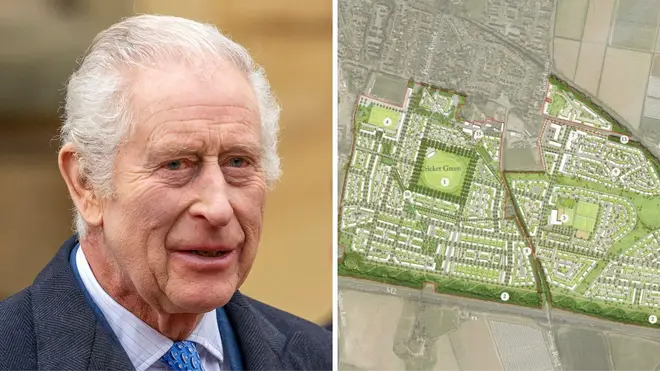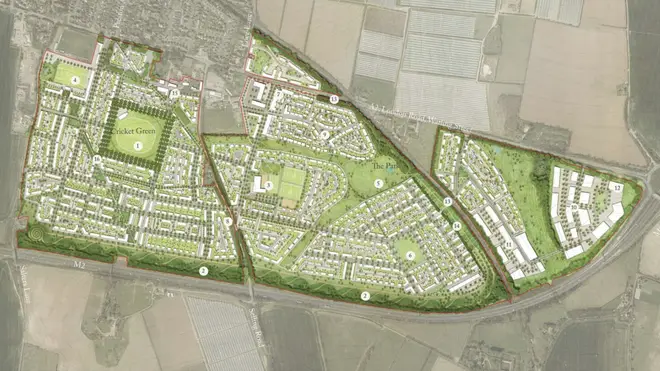
Nick Ferrari 7am - 10am
7 April 2024, 08:32 | Updated: 7 April 2024, 08:54

King Charles has sparked outrage over plans to build an 'ideal town' in Kent, amid concerns it will 'swallow up historic villages into an urban mass'.
The proposed plans would see 2,500 homes built on 320 acres of farmland in Faversham, Kent.
They were first announced when Charles managed the Duchy in 2018, with 120 homes intended to be built per year across 20 years.
An application for consent to start on the initial 261 homes was submitted in December 2023.
But locals are not happy with the proposed changes, with some arguing the plans are “totally at odds” with the King’s stance on environmental and farming issues.
Residents have also argued that the town does not have the infrastructure support such a development, according to The Telegraph.
Read more: King Charles to open up Balmoral Castle to public for first time
The proposals were put forward in a bid to tackle the housing crisis and would deliver an 'ideal town' similar to the Duchy’s first “urban extension” in Poundbury.
The plot, which is to the south-east of Faversham, was acquired by the Duchy in 1999.
There will be "affordable homes designed and built to the same high-quality standards, indistinguishable from market homes", the development website says.
It adds: "South East Faversham will be an attractive, modern and enjoyable place in which people can live, work, shop and relax. It will be guided by local needs and inspired by the character of Faversham."
There will be space for "food stores and independent retailers, craftmakers and producers" along with a new high street and primary school.
"Options are being explored for a care home and potentially a range of health related facilities," the website says.

The plans saw a widely negative response from locals after they were put out for public consultation with Swale Borough Council.
One complaint last week said: "The Duchy proposes such a development with the consequential loss of a huge area of fine productive agricultural land.
"This seems totally at odds with HRH’s public stance on environmental and farming issues."
Addressing the development in a Facebook campaign group, another resident said: "It seems there’s no end to the greed of Prince William and King Charles!!
"It’s a disgrace that they pose as environmentalists when in fact they’re like all developers and it’s purely about the money! And what about food security?? All this Grade 1 and 2 farmland being concreted over."
A third person added: "My family are very proud 3rd-generation Duchy farmers and they feel ashamed and betrayed. No honour, just greed.
"We were hoping the Royals were maybe oblivious to it all, with good intentions, but it’s all a gloss."
Another resident said: "Do you really want it to be ‘on your watch’ that all our historic villages are swallowed up into one urban mass, and so much vital agricultural land will be lost forever?"
A spokesman for the Duchy of Cornwall said: “South-east Faversham will, if planning permission is granted, follow in the footsteps of Poundbury, Nansledan and other sustainable Duchy developments and become one of the most environmentally friendly neighbourhoods in the United Kingdom.
“It will prioritise access to green spaces, sustainable transport and will focus on the community’s needs – including affordable housing and a new primary school as well as new traffic infrastructure and healthcare services.
“New green spaces including meadows, orchards, allotments and woodland means biodiversity is set to increase by 20 per cent while a focus on sustainable travel and building a walkable neighbourhood is expected to generate 20 per cent fewer car trips compared to similar-sized communities.”